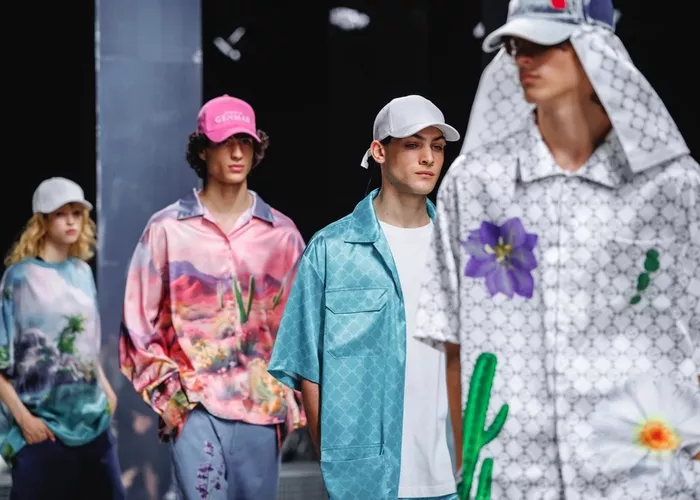The Arab fashion scene is evolving beyond its traditional staples like abayas, thobes, and keffiyehs, showcasing a blend of architectural couture, edgy streetwear, and other diverse styles. Cities like Dubai, Riyadh, and the Red Sea are now hosting their own fashion weeks, spotlighting fresh talent on the global stage. These events are adding a new dynamic to a calendar that has long been dominated by the fashion capitals of New York, Paris, Milan, and London. The Middle East is establishing itself as a cultural and creative hub, with the potential to redefine fashion’s global landscape.
As luxury brands increasingly turn their attention to the Arab world, these fashion weeks are becoming essential for identifying emerging talent, understanding consumer preferences, and staying ahead in the fast-paced fashion industry. The question remains, however, whether these Middle Eastern events can eventually rival the influence of the world’s biggest fashion weeks.
Dubai Fashion Week (DFW), which rebranded from Arab Fashion Week in 2023, has become a key fixture in the global fashion calendar. Its 2025 edition, held from February 1 to 6, welcomed designers from various parts of the world, including Lebanon, France, India, and the UK. The event featured a diverse mix of high-profile names, such as Iraqi haute couture designer Zeena Zaki, luxury streetwear label Les Benjamins from Istanbul, and bridal brand Paolo Sebastian, marking the first time an Australian label had presented at DFW. The event also highlighted a multi-designer showcase curated by That Concept store, an initiative by Emirati conglomerate Majid Al Futtaim, which celebrated innovative design and contemporary luxury.
Mohammed Aqra, Chief Strategy Officer of the Arab Fashion Council, emphasized Dubai’s growing role as a creative hub. He noted that designers are not only drawn to the city for its exposure but also for its vision and collaboration, which foster brand growth. With a focus on commercial opportunities, DFW now includes a buyers’ program that allows designers to present their collections to select international buyers. Exclusive events, such as private dinners and brand launches, further energize Dubai’s fashion scene, solidifying the UAE’s transformative impact on the industry.
Saudi Arabia followed Dubai’s lead with the launch of Riyadh Fashion Week (RFW) in late 2023, aiming to provide a platform for the Kingdom’s growing fashion scene. RFW’s debut edition showcased 29 local brands, including Abadia, Adnan Akbar, and Atelier Hekayat. The second edition saw the number of Saudi designers increase to 37, many of whom had participated in the Saudi 100 Brands mentorship program. The event was a dynamic blend of fashion presentations and a curated showroom of local brands, reflecting Saudi Arabia’s commitment to blending traditional aesthetics with modern sophistication.
Burak Cakmak, CEO of the Saudi Fashion Commission, described RFW as a catalyst for fostering homegrown talent and creating new opportunities in both fashion and retail. He highlighted the event’s role in supporting the Kingdom’s broader vision to develop its creative economy and shift its global image toward cultural leadership.
In May 2024, Saudi Arabia introduced a second fashion week, Red Sea Fashion Week (RSFW), held at the St. Regis Red Sea Resort. The event featured renowned names such as Saudi haute couture designer Tima Abid, Miami-based vegan silkwear brand Niluu, and Moroccan swimwear label eau. While RFW focuses on luxury fashion and ready-to-wear, RSFW distinguishes itself by spotlighting resort wear, swimwear, and elevated leisurewear. The event also places a strong emphasis on international participation, with non-Saudi designers contributing to its diverse lineup, highlighting the Kingdom’s commitment to cultural exchange.
RSFW’s location in the Red Sea aligns with Saudi Arabia’s larger tourism ambitions, positioning the region as a luxury travel hotspot. As part of Saudi Vision 2030, the country is developing the Red Sea into a major regenerative tourism destination, with a focus on sustainable luxury resorts and wellness initiatives.
Despite their promise, these regional fashion weeks still have a long way to go before they can challenge the established Big Four. DFW, for example, evolved from Arab Fashion Week, founded in 2015, making it relatively young compared to New York Fashion Week, which dates back to 1943. Key to these events’ growth will be creating a more comprehensive fashion ecosystem and ensuring accessibility for international visitors.
Reiting Lee, founder of The Oriental Hybrid, a consulting firm specializing in sustainable fashion, pointed out that there is still a lack of varied showrooms and curated side events, which are key elements in cities like Paris or Shanghai. She also noted challenges for international media and buyers in gaining access to fashion week materials and showrooms in Saudi Arabia. However, she argued that not being part of the “Big Four” could actually work in favor of these events. For example, RSFW may not compete with Paris in terms of legacy, but it offers a unique experience rooted in natural beauty and cultural immersion. Similarly, DFW serves as a gateway for brands aiming to reach consumers across the GCC, South Asia, and North Africa, regions that are increasingly shaping global fashion trends.
For emerging brands, these Middle Eastern fashion weeks present a valuable opportunity to gain exposure. Lee observed that fashion weeks in the GCC tend to attract significant media attention, offering a less competitive environment for designers to stand out.
In the end, these fashion weeks are more than just extravagant displays—they are strategic initiatives. Through fashion, cities like Dubai, Riyadh, and the Red Sea are not only establishing themselves as global cultural capitals but also leading the charge toward a new era of creative and commercial innovation.
Related Topics
- Pharrell’s Louis Vuitton Pre-Fall 2025 Collection: A Miami-Inspired Cruise from Paris to the 305
- Mack Weldon Locks Prices on Underwear to Combat Tariff Uncertainty and Boost Sales
- Freemans Expands Menswear Range with New Third-Party Brands and Exciting Additions

